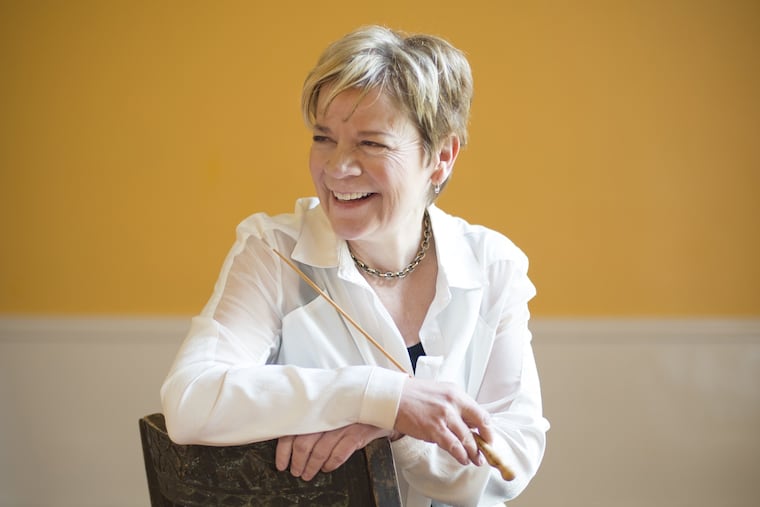Philadelphia Orchestra names a new conductor
Marin Alsop is no stranger to Philadelphia, and now her role with the city's orchestra will expand

The Philadelphia Orchestra is adding a seasoned American conductor to its artistic leadership team. Marin Alsop, who served as the Baltimore Symphony Orchestra’s music director for nearly a decade and a half, will become Philadelphia’s principal guest conductor starting this fall, the orchestra announced Tuesday.
Alsop has not been one of the orchestra’s most frequent visitors, but in recent years her appearances have gained in frequency and visibility — including a last-minute Carnegie Hall appearance last April leading the Philadelphians in no less a perilous piece than The Rite of Spring.
“I’ve always loved working with the orchestra and I think we’ve had a good rapport over the years. I think the timing just was right,” Alsop said of her new Philadelphia post, which begins with a three-year contract.
Her first appearance with the orchestra was more than three decades ago, in 1990. She was 33 years old, music director of two small orchestras, and leader of the Concordia Orchestra, an ensemble she started herself to gain podium experience.
Alsop recalls her Philadelphia Orchestra debut — a formidable program of works by John Adams, Toru Takemitsu, Roy Harris, and Béla Bartók — as her first big opportunity. At the time, and until very recently, a woman on the podium in Philadelphia was a rare sight.
“They gave me a huge subscription concert — an all-orchestral subscription concert. I’ll never forget the experience, and also the trust that they put in a kid.”
Alsop is now 67, and the fact that the orchestra chose a principal guest conductor with vast experience rather than an upstart talent is significant.
Philadelphia Orchestra and Kimmel Center, Inc. president and CEO Matías Tarnopolsky calls Alsop’s decades of experience “a valuable perspective to bring,” and noted her “rich legacy within the American musical scene as well as [her place as] somebody who has really set a path for women conductors.”
Alsop brings “a very broad perspective on the repertoire, which we appreciate greatly,” Tarnopolsky said, and “an artistry and energy and a warmth in her interpretation that is profoundly appealing to the musicians of the orchestra and audiences alike.”
Case in point: Last May, Alsop led the orchestra in its second annual Pride Concert, which featured some head-spinning variety: a Lady Gaga song, a movement from Jennifer Higdon’s Concerto for Orchestra, and the suite from The Marvels film.
Not that she neglects the standard repertoire.
“A precise and transparent, yet terrifyingly alive” Rite of Spring is how a New York Times critic described the performance of that piece last season at Carnegie, when she replaced Philadelphia music director Yannick Nézet-Séguin on short notice.
Alsop trained at the Juilliard School and is currently chief conductor of the ORF Vienna Radio Symphony Orchestra and Chicago’s Ravinia Festival. As music director of the Baltimore Symphony from 2007 to 2021, she is the first woman to head a major American orchestra.
Tarnopolsky says Alsop’s appointment does not mean any less of a presence in Philadelphia for Nézet-Séguin, who also leads the Metropolitan Opera and keeps a busy calendar of musical projects outside of Philadelphia. “He’s the first to step in whenever there’s a cancellation [of another conductor],” said Tarnopolsky. “He really feels intensely his responsibility to the musicians and audiences of Philadelphia and I’ve been really struck by his musical and institutional leadership in the last years.”
Alsop follows Nathalie Stutzmann, whose final concerts in her three-year tenure as principal guest conductor are this April. Plans for Alsop are still developing, but she’s already signed on for some high-profile assignments, including leading the orchestra’s tour to China in the fall of 2024 and the world premiere of Gabriela Lena Frank’s Picaflor in March of 2025.
In terms of repertoire, Alsop has a wide range — from Tchaikovsky and Barber to contemporary composers like Jessie Montgomery and Malek Jandali.
When considering whether to perform a new work or champion a particular composer, she says she’s listening for an authentic sense of voice and personality.
But, in addition: “I think music has to have some kind of narrative. With a narrative, it becomes human and transports us, so I guess I’m always looking for the story,” she says. “And you could even say, in this time we live in, I’m even more interested in the moral of the story — you know, that there is a reason for this to be here.”
Every principal guest conductor makes the job their own, and the key, Alsop says, is about finding artistic gaps that aren’t already being heard — composers and particular pieces, but also soloists and new ideas for the organization in general.
“It’s one of those jobs where you have to go day by day and adapt and see how it feels.”